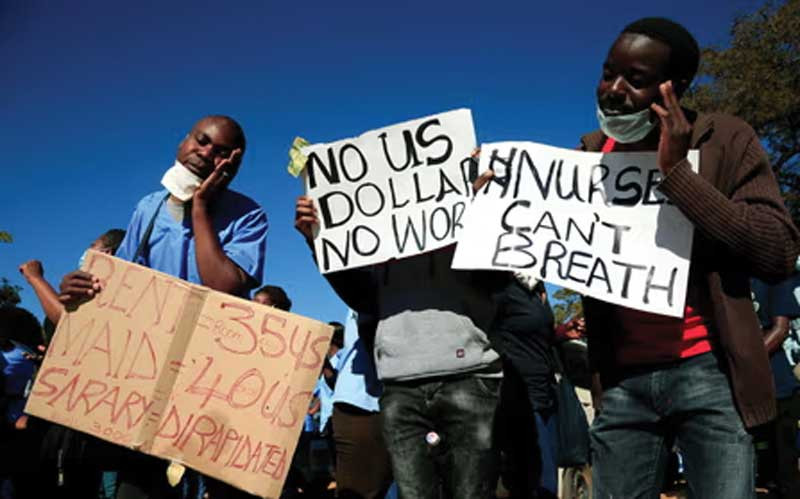
STRUGGLING to survive on her meagre salary, Zimbabwean nurse Jane decided to start a new life abroad but, one year after landing a job in the United Kingdom (UK), she is still waiting to pack her bags.
Jane is not alone. Zimbabwean nurses eager to escape worsening poverty say their government is barring them from pursuing opportunities overseas as it seeks to stem a brain drain of health workers.
“The government is holding me to ransom now,” said Jane (35) who only used her first name for fear of reprisals.
“I’m really worried I might not be able to leave,” added the single mother-of-three who can no longer afford to eat lunch as sky-high inflation erodes her finances.
Nurses say authorities are frustrating their efforts to migrate by failing to provide a crucial document confirming their professional status without which they cannot take up overseas jobs.
The Health ministry took over the issuing of “verification letters” early last year from the Nurses Council of Zimbabwe — the profession’s regulatory body — which used to turn them around within days.
Unions in the southern African country estimate that thousands of nurses are affected.
Simbarashe Tafirenyika, president of the Zimbabwe Urban and Rural Council Nurses Workers Union, said some ministry officials were exploiting the situation by demanding hefty bribes to expedite the process.
- Zim health system is in intensive care: How it got there
- Measles threat growing
- Take your child for measles vaccination
- Residents cry foul over Ngozi Mine pollution
Keep Reading
The government, which has also doubled the document application fee to US$300, did not respond to requests for comment, but ministers have repeatedly voiced concern over the exodus of doctors and nurses abroad.
Vice-President Constantino Chiwenga, who has announced plans to criminalise the foreign recruitment of health staff, says it is wrong that Zimbabwe spends vast sums training health workers only for them to be poached by richer countries.
But nurses say it is unfair for the government to stop them leaving when many of them earn less than US$100 a month.
Red list
More than 4 000 health workers, including more than 2 600 nurses, left Zimbabwe in 2021 and 2022, according to official statistics. Traditional destinations include Canada, Australia and UK where the starting salary for a nurse is about £28 400 (US$34 490).
The World Health Organisation this year added Zimbabwe to the “red list” of countries with pressing healthworker shortages. In 2020, Zimbabwe had 2,1 nurses and midwives per 1 000 people, less than a quarter of the number in UK, according to the latest World Bank data.
UK, which relies heavily on overseas-trained nurses to plug its own staff shortages, has stopped actively recruiting from Zimbabwe. However, this does not prevent nurses applying for jobs directly.
More than 4 330 nurses trained in Zimbabwe are registered with UK’s Nursing and Midwifery Council (NMC).
A spokesperson for NMC said it was aware of the issue with verification letters in Zimbabwe although some were still coming through. Union president Tafirenyika said nurses were also migrating without verification letters to do non-nursing jobs.
He said some were even taking short first aid courses in order to get an internationally recognised “nurse aid” certificate — a route to less skilled jobs in health and social care.
Strike ban
Jane, who has 10 years’ experience, works at a hospital in the capital Harare. But her US$200 monthly salary does not cover her bills so she also sells clothes and perfumes online. Other nurses she knows juggle hospital shifts with selling clothes and groceries illegally on the streets where they are often chased by the police.
“They endure all this to put food on the table,” Jane said. “Some nurses spend the whole day without eating anything at work.”
A significant problem for nurses is that their salary is paid in a mix of US dollars and Zimdollars. With most shops and businesses charging in US dollars, nurses have to convert the portion paid in local currency, which has plunged in value this year.
Jane said 5% of her salary vanished in bank charges and a quarter went to commuting to and from her home in Harare’s outskirts.
Thousands of nurses and doctors went on strike last year demanding a major pay raise and calling for their wages to be paid entirely in US dollars. In January, Zimbabwe banned healthcare workers from striking for more than three days, introducing penalties of up to six months in jail.
Patients pay for own drugs
Nurses said they were also frustrated working in a broken health system with little opportunity to further their careers. Hospitals do not only lack equipment, including ventilators and X-ray machines, but even painkillers and rubber gloves can be in short supply.
Nurses said patients often had to buy their own drugs.
“The situation is really pitiful,” said Jane. “There’s no equipment for some procedures leading to a lot of cancellations.
“Women are delivering babies without linen and have to sleep on the floor after giving birth. There is no lignocaine (local anaesthetic) if they need stitches so they have to buy it themselves.”
Tanaka (28) who works at another Harare hospital, is also demoralised.
“It’s tough to ask patients to buy their own drugs — imagine, even paracetamol!” she said.
“We work without PPE (personal protective equipment). I fear for my health. Enough is enough.”
Tanaka had hoped to relocate to the UK in the summer after receiving a job offer last year but is still awaiting her verification letter.
“I was afraid when they said they want to bring in a law to bar us from going. That is scary,” Tanaka said.
Migrating is not cheap. She has already spent US$1 200 on taking a professional exam required to be able to work in UK and on other expenses. She also needs to pay for an English language test and TB test but has put these on hold amid uncertainty over whether the government will issue her document.
Tanaka, who has a five-year-old daughter, knows life in UK is expensive — average monthly rents top £2 000 in parts of London — but she said she cannot afford to stay in Zimbabwe.
“I take home a paltry $200. It’s not enough to feed my family or even buy clothes for my child. I have no choice,” she said.










